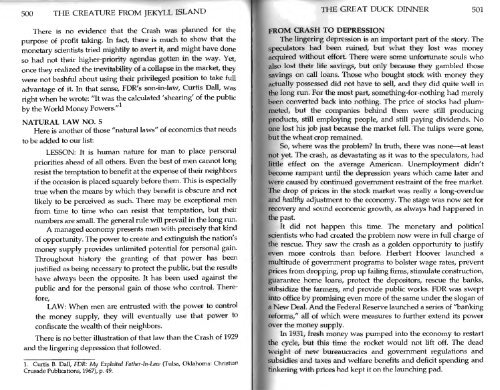Create successful ePaper yourself
Turn your PDF publications into a flip-book with our unique Google optimized e-Paper software.
500 THE CREATURE FROM JEKYLL ISLAND<br />
There is no evidence that the Crash was planned for the<br />
purpose of profit taking. In fact, there is much to show that the<br />
monetary scientists tried mightily to avert it, and might have done<br />
so had not their higher-priority agendas gotten in the way. Yet,<br />
once they realized the inevitability of a collapse in the market, they<br />
were not bashful about using their privileged position to take full<br />
advantage of it.<br />
In that sense, FDR's son-in-law, Curtis Dall, was<br />
right when he wrote: 'It was the calculated 'shearing' of the public<br />
by the World Money Powers."<br />
NATURAL LAW NO. 5<br />
Here is another of those "natural laws" of economics that needs<br />
to be added to our list:<br />
LESSON: It is human nature for man to place persona]<br />
priorities ahead of all others. Even the best of men cannot long<br />
resist the temptation to benefit at the expense of their neighbors<br />
if the occasion is placed squarely before them. This is especially<br />
true when the means by which they benefit is obscure and not<br />
likely to be perceived as such. There may be exceptional men<br />
from time to time who can resist that temptation, but their<br />
numbers are small. The general rule will prevail in the long run.<br />
A managed economy presents men with precisely that kind<br />
of opportunity. The power to create and extinguish the nation's<br />
money supply provides unlimited potential for personal gain.<br />
Throughout history the granting of that power has been<br />
justified as being necessary to protect the public, but the results<br />
have always been the opposite. It<br />
has been used against the<br />
public and for the personal gain of those who control. Therefore,<br />
LAW: When men are entrusted with the power to control<br />
the money supply, they will eventually use that power to<br />
confiscate the wealth of their neighbors.<br />
There is no better illustration of that law than the Crash of 1929<br />
and the lingering depression that followed.<br />
1. Curtis B. Dall, FDR: My Exploited Father-In-Laiv (Tulsa, Oklahoma: Christian<br />
Crusade Publications, 1967), p. 49.<br />
THE GREAT DUCK DINNER 501<br />
FROM CRASH TO DEPRESSION<br />
The lingering depression is an important part of the story. The<br />
speculators had been ruined, but what they lost was money<br />
acquired without effort. There were some unfortunate souls who<br />
also lost their life<br />
savings on call<br />
savings, but only because they gambled those<br />
loans. Those who bought stock with money they<br />
actually possessed did not have to sell,<br />
and they did quite well in<br />
the long run. For the most part, something-for-nothing had merely<br />
been converted back into nothing. The price of stocks had plummeted,<br />
but the companies behind them were still producing<br />
products, still employing people, and still paying dividends. No<br />
jDne lost his job just because the market fell. The tulips were gone,<br />
but the wheat crop remained.<br />
So, where was the problem? In truth, there was none—at least<br />
not yet. The crash, as devastating as it was to the speculators, had<br />
little effect on the average American. Unemployment didn't<br />
become rampant until the depression years which came later and<br />
were caused by continued government restraint of the free market.<br />
The drop of prices in the stock market was really a long-overdue<br />
knd healthy adjustment to the economy. The stage was now set for<br />
recovery and sound economic growth, as always had happened in<br />
the past.<br />
It did not happen this time. The monetary and political<br />
scientists who had created the problem now were in full charge of<br />
the rescue. They saw the crash as a golden opportunity to justify<br />
even more controls than before. Herbert Hoover launched a<br />
multitude of government programs to bolster wage rates, prevent<br />
prices from dropping, prop up failing firms, stimulate construction,<br />
guarantee home loans, protect the depositors, rescue the banks,<br />
subsidize the farmers, and provide public works. FDR was swept<br />
into office by promising even more of the same under the slogan of<br />
a New Deal, And the Federal Reserve launched a series of "banking<br />
reforms," all<br />
over the money supply.<br />
of which were measures to further extend its power<br />
In 1931, fresh money was pumped into the economy to restart<br />
the cycle, but this time the rocket would not lift off. The dead<br />
Weight of new bureaucracies and government regulations and<br />
subsidies and taxes and welfare benefits and deficit spending and<br />
tinkering with prices had kept it on the launching pad.


